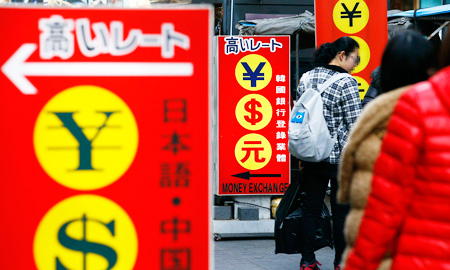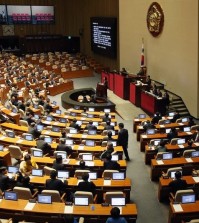- California Assembly OKs highest minimum wage in nation
- S. Korea unveils first graphic cigarette warnings
- US joins with South Korea, Japan in bid to deter North Korea
- LPGA golfer Chun In-gee finally back in action
- S. Korea won’t be top seed in final World Cup qualification round
- US men’s soccer misses 2nd straight Olympics
- US back on track in qualifying with 4-0 win over Guatemala
- High-intensity workout injuries spawn cottage industry
- CDC expands range of Zika mosquitoes into parts of Northeast
- Who knew? ‘The Walking Dead’ is helping families connect
Ultra low yen adds woes to Korean economy

A man passes by an electronic stock board of a securities firm in Tokyo, Tuesday, as Asian stocks mostly fell on concern about feeble Chinese trade figures, Japan’s recession and weaker-than-expected German industrial growth. The Japanese yen is expected to weaken further at a faster rate against the won, making Korean exports less competitive. (AP)
By Yoon Ja-young
The yen is expected to weaken further at a faster rate against the won, dealing a severe blow to Korean exporters competing with their Japanese rivals overseas, analysts said Tuesday.
They said the yen has fallen twice as fast against the greenback as the Korean won, and the trend is likely to continue next year. While the yen lost around 12 percent against the dollar since Tokyo announced further monetary easing in October, the Korean won lost only around 6 percent.
The ultra weak yen is coupled to the strengthening dollar, triggered by falling international oil prices.
Prices have been falling steep due to oversupply and a slowdown in demand in emerging economies. As oil producing countries convert revenue into dollars, falling prices lead to a strengthening of the dollar.
Analysts said that despite the possibility of the yen’s rebound from recent steep falls, its downward trend will continue for a while.
“The recent strengthening of the dollar is similar to two previous periods, the first between 1978 and 1985 and the second between 1995 and 2001. The dollar has fundamentally entered a new strong phase,” said Park Sang-hyun, an analyst at HI Investment and Securities.
“As the Japanese government is likely to expand liquidity, the yen is expected to weaken further. The rate may rise even faster if it surpasses 120 yen per dollar,” he said.
The won has gained 61 percent in value compared with the yen since June 2012. Oh Jung-gun, president of the Asia Finance Society, expected that rate may fall to around 850 won per 100 yen by next year.
“When considering that Korea and Japan are competing in exports, the strengthening of the won against the yen will be a burden for the local economy,” said Choi Mun-bak, a researcher at LG Economic Research Institute.
“While conglomerates can dampen the shock by increasing production overseas, small- and medium-sized players will be fully exposed to the negative effect, losing competitiveness,” he said.
He picked automobile parts, shipbuilding and machinery as the sectors that are directly competing with Japan, and make up a huge portion of Korea’s exports.
“Japanese firms may start a price competition as the weak yen continues,” he said.
Meanwhile, the finance ministry said that falling international oil prices could also hamper economic growth.
“Falling prices will have a positive effect by cutting production costs for businesses and increasing the real purchasing power of households,” the Ministry of Strategy and Finance said in a report.
However, it added that it can “hamper economic growth, coupled with the current low inflation.” The economic slowdown of oil producing countries could also negatively affect Korea’s exports to these countries.
“When considering the external and internal uncertainties, there will be limitations in falling oil prices to immediately lead to consumption or investment. The shipbuilding and the petrochemical industries may suffer worsening profitability.”
It added that the government will push for economic stimulus measures to boost consumption and investment, to maximize the positive effect of falling oil prices.















